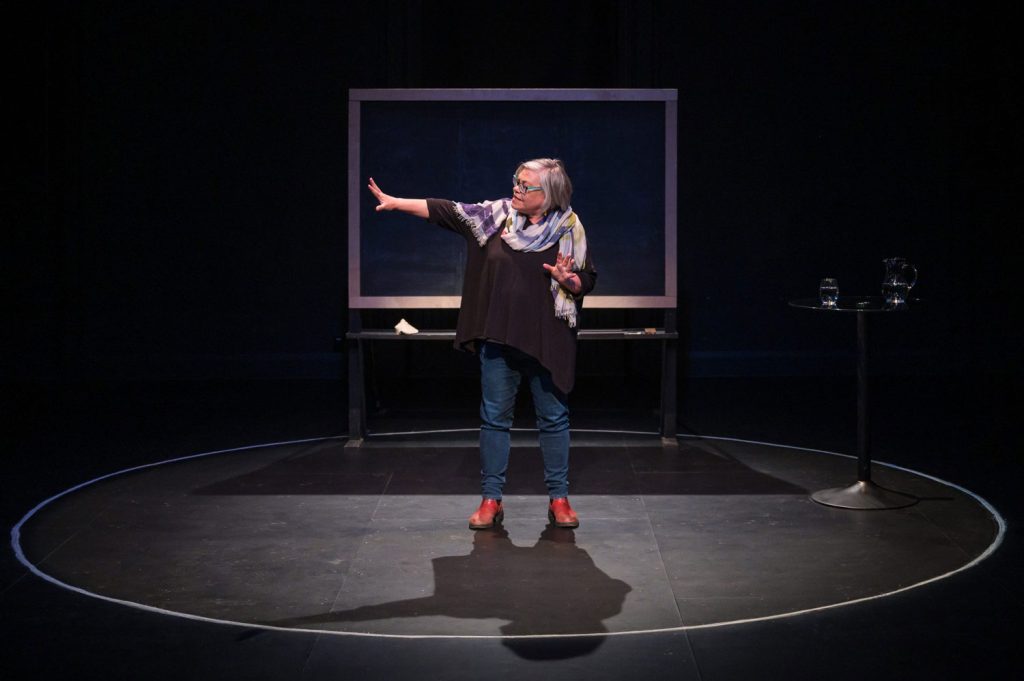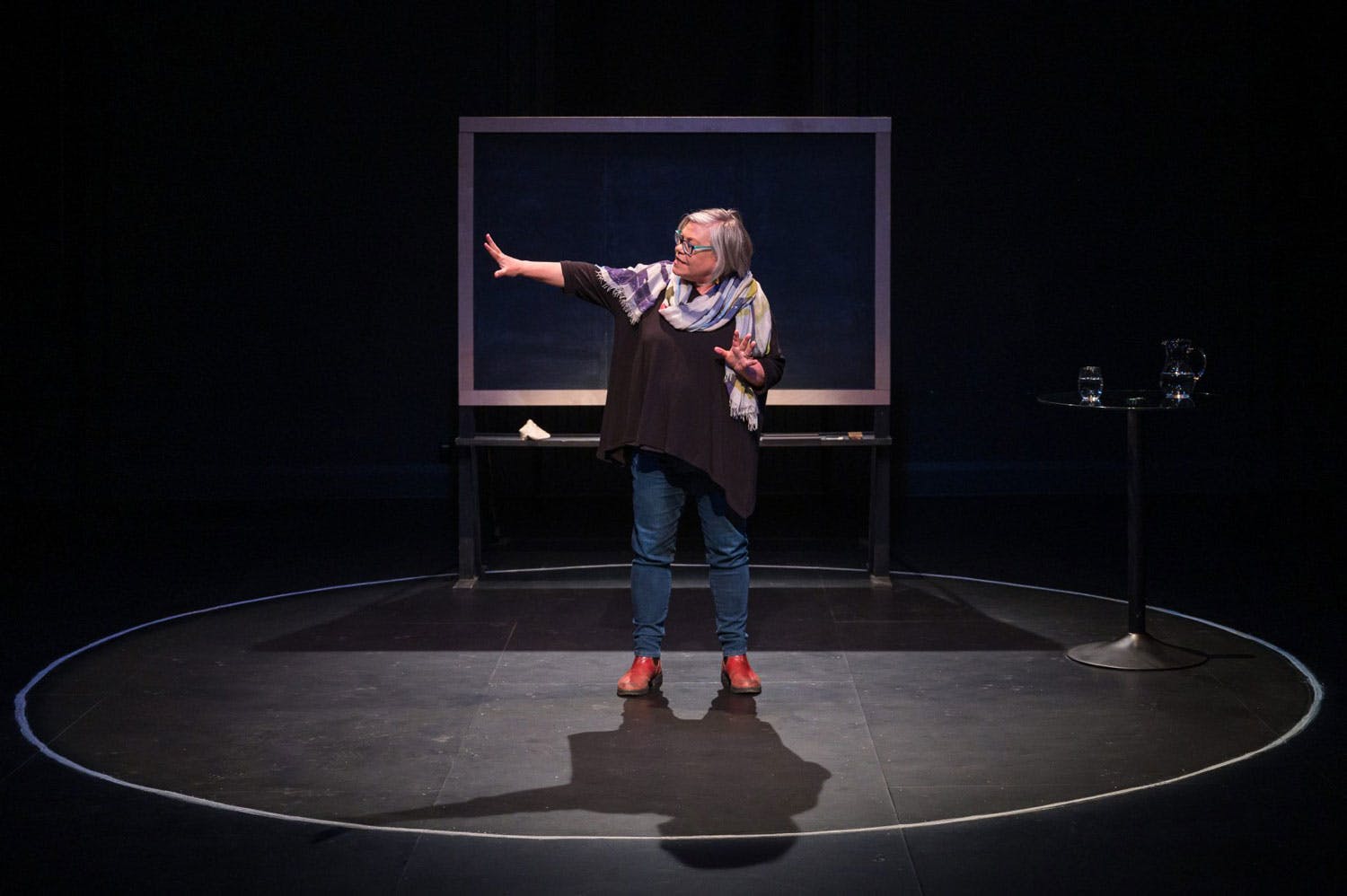To Save the Oceans, this Journalist Took to the Stage
Alanna Mitchell’s solo show on climate change reveals the power of live theatre.
2022 marks Alanna Mitchell’s eighth year touring Sea Sick, her one-woman show about the climate change’s impact on the oceans.
Award-winning author and science journalist Alanna Mitchell says that the creation of Sea Sick, her one-woman play about the oceans and climate change, was “a total fluke.”
Mitchell’s path to performing started with a book, also titled Sea Sick, which became the basis for the play. “After the book was published, I started giving talks about the research and I was terrible at it. One of the first talks I ever gave was in Vancouver… and there was just way too much information. It was just this wretched, wretched talk,” Mitchell recalls.
But in 2012, Franco Boni (then Artistic Director of Toronto’s Theatre Centre) attended one of Mitchell’s talks. “He came up to me afterwards and said, ‘I think we can make this into a play.’ And I just said yes,” she recalls. Now, Sea Sick is in its eighth year of touring. The unlikely blend of science communication, memoir, and theatre (directed by Boni with Why Not Theatre’s Ravi Jain) returns to Vancouver, BC, from February 9 to 19, 2022, for a run at the Cultch’s Historic Theatre.
As Mitchell gave talks on the book around the world, her approach changed. “I learned to tell the stories of the scientists. That’s the really important stuff,” says Mitchell. “It’s not just the findings — it’s the story of who made the findings and what drove them to do it.”
Those findings have changed as our carbon use has continued, so Mitchell has consistently re-written the play since it first opened in 2014. “The play evolves. It keeps changing because… the numbers in the science keep changing.” Atmospheric carbon is one example: during Sea Sick’s first run, the carbon concentration in the air had just breached 400 ppmv (parts per million volume). It is now approximately 420 ppmv.
The cultural impact of climate change changes, so I keep rewriting the play.
“I think the cultural impact of climate change changes as well, and so I keep rewriting the play,” Mitchell says. “The version I’m going to perform in Vancouver has, I think, the fifth ending.”
The show has a modest format. Mitchell stands alone for the whole play, a chalkboard behind her, a pitcher of water beside her. This intimate arrangement, Mitchell says, helps everyone in the theatre feel engaged and present. “It’s not always verbal, but I can feel that energy. There’s quite a bit of laughter, strangely, or they sometimes cry. And I’m feeling all that,” she says. “The degree of intimacy is intoxicating.”
Over the years, Mitchell has noticed a shift in how audiences respond to the show. “I think it lands differently with people now than it did in 2014. There wasn’t the same kind of cultural context for the play that there is now,” she explains. “Now, it feels like there’s greater general knowledge… and greater need to understand what we should do about it.”

2022 marks Alanna Mitchell ‘s eighth year touring Sea Sick, her one-woman show about the climate change’s impact on the oceans.
In the reactions to the main performance and in the after-show talk-back sessions, audiences are letting their feelings out. “[They are] more engaged. More emotional. I think there’s an emotional release that happens in the play. Because… there’s greater knowledge of how high the stakes are.”
Often, though, the audience’s catharsis comes with anxiety or dread about the uncertain future of the ocean, and the planet as a whole. Mitchell knows the feeling too well. “That’s exactly what I encountered when I wrote the book.” She describes the profound depression she experienced during and after writing the book. Eventually, though, she emerged with a sense of purpose and a new medium for her work.
Ultimately for Mitchell, the goal is to help audiences overcome insurmountable-feeling climate dread, despite the grim news: “What I want is for people to feel as if they can step over the mountain after they get out of the play.”
The last few years have been a period of reflection for Mitchell and her team. One point of consideration has been the carbon footprint of touring around the world. “In 2019, we [asked ourselves], were we ever going to go on tour again.” In the end, they decided getting the message out was worth it. “And of course,” she explains, “we offset the carbon by planting seagrasses. We have a carbon offset budget built into the play.”
Mitchell still wrestles with whether the offset efforts are enough, but feels that the show should continue. “I had a choice. I could either fold up my tent, knowing the situation we’re in and not do the play, and just hope that somehow things change,” she says. “Or, I could do what I felt was my part to try to encourage people to understand what was at stake. And ultimately I decided to keep going.”
I have a line in the play that “science can only take us so far.” And you see that played out time and time again.
Then, the pandemic took Sea Sick off the stage in 2020. Mitchell returned to performing in fall 2021 with a small tour to Ireland and Scotland, and felt a renewed appreciation for theatre. “It was just amazing to be back with live people again. I could feel again this sense of community, this sense of being with people, learning and communicating with each other. And it… made me fall in love with the play all over again.”
Mitchell says that the intimacy of live theatre can reveal the role of art in fighting climate change. “I have a line in the play that is something like ‘science can only take us so far.’ And you see that played out time and time again in the public sphere.” Scientists continue to better measure and predict our impact on the world. But Mitchell finds that data points alone aren’t enough to get through to the emotional aspects of the issue. “I feel that art is the way that the material can really penetrate. It can puncture.”
